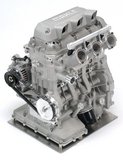This is the main challenge that Mahle has had to face for over 80 years. Mahle is a leading supplier of car components, employing 38,000 people at 70 locations throughout the world. The company has its headquarters in Stuttgart and specialises in developing and manufacturing engine components, with products ranging from single filters to complete system solutions.
“In fact, we could also make the entire engine,” says Otto Mehrer, Production Manager at the Mahler Filter Plant in Öhringen, as he described the range of products that his company produces; however he admitted that such a development still lies in the future. The car engine continues to be a manufacturer’s image-making core skill – and that’s why they will continue to be identified with the manufacturer’s own brand and logo. It is that brand image that has given rise to the demand for quality that manufacturers place on suppliers of crucial system components. And they are requirements that Mahle considers carefully when selecting its own suppliers. Every day, every employee involved in production must ensure that he or she is actually implementing the Mahle maxim which is “to make what is good even better”.
High product requirement profile
One of Mahle’s suppliers is Arnold Umformtechnik GmbH, based in south-west Germany. The company, which belongs to the Würth group, has taken a leading position in Europe as manufacturer and supplier of specialist screws – supplying Mahle and many other manufacturers. Unlike most of its competitors, Arnold has identified a tremendous cost-saving potential in fastening technology.
This is confirmed by Otto Mehrer, Production Manager at Mahler’s Öhringen plant, where Arnold products have been used on its production line for some ten years. In particular self-tapping screws, such as the Taptite 2000 products from Arnold, have led the production specialists at Mahle to realise that the cost elements lie not so much in the cost of the part itself and the material it is made of - in actual fact the cost of the screw itself represents a mere 15 percent of the overall cost of a screw fastening. However its potential to increase efficiency throughout the process is the factor that reduces the overall cost. Cost analyses carried out by Mahle clearly show that a self-tapping screw, which is only just about a third more expensive than a conventional screw, ultimately reduces manufacturing costs by up to 80 per cent. “In principle, by using self-tapping fasteners, we can make a sustained reduction in the overall cost of preparing the screw location,” said Otto Mehrer, confirming Arnold’s own findings, which arrived at similar conclusions, and which show why there is a distinct move towards direct screw fastenings.
Reducing costs throughout the process
“According to our findings, when inserted into pre-cast holes, self-tapping fasteners reduce processing costs by around 0.25 euro per piece – without affecting quality in any way,” commented Mehrer as he highlighted Arnold’s products. The most crucial factors are the fact that the construction of the screws provides process reliability and that the number of separate process steps is significantly reduced.
In fact different levels of savings can be made depending on whether the fasteners are used in manual, semi-automated or automated screw fastenings – they range from 65 percent for manual screw fastenings to 80 percent on automatic assembly lines. But another crucial factor is the much lower investment required which, compared with traditional fasteners, has a particularly noteworthy effect on upstream and downstream production costs. “Direct fastening solutions reduce management costs. These involve pre-production costs such as development, logistics, buying and warehousing costs, as well as keeping costs down in our quality department,” concluded Mehrer.
Where fastenings can be made into pre-cast holes, no drilling or thread-cutting is required. So there is no need for the relevant tools, such as the processing centre and washing unit required for the screw locations where metric threads are used. The same applies to pumps and to the disposal systems required for cutting emulsions, and to the measuring instruments needed to check the gauge size of metric threads. Consequently, the use of self-tapping screws, especially on new production lines signifies considerable savings on investment in mechanical processing stations. A further factor positively expressed in the overall calculation is the time gained in the process flow.
Increasing acceptance of direct screw fastenings
In all we are noting a proportion of around 40 percent of metal direct screw fastenings – and it is rising. We still have to break down some of the prejudices held by our customers. Ultimately it is our clients who, on the whole, specify the type of fastening technology they want,” said Otto Mehrer, pointing out the constraints. “So that makes it even more important to ensure that specialists such as the Project Managers at Arnold are included into the development process for new modules. Because it is only by taking such far-sighted decisions at the early design engineering stage that the full cost-saving potential can be realised,” concluded Otto Mehrer, summing up the future of self-tapping direct fasteners such as Taptite 2000.

